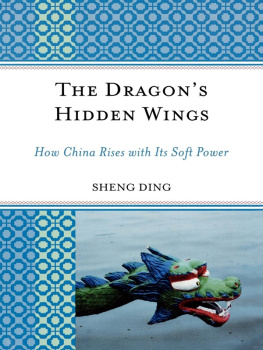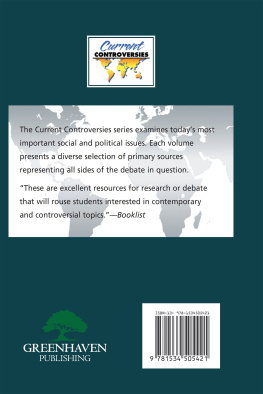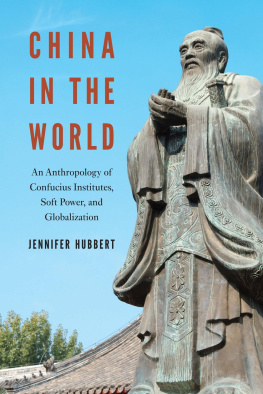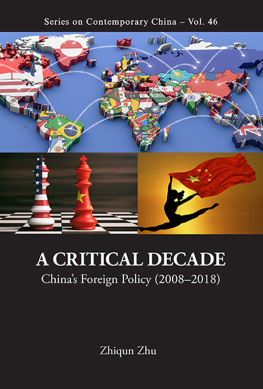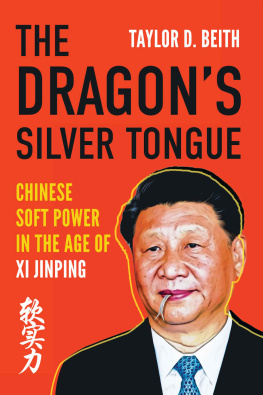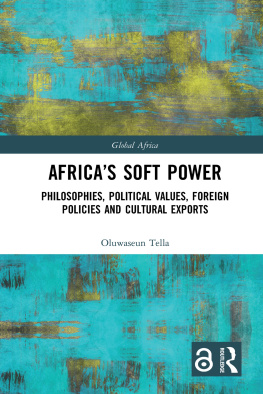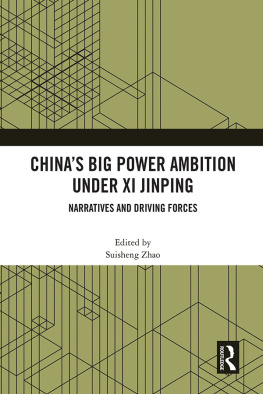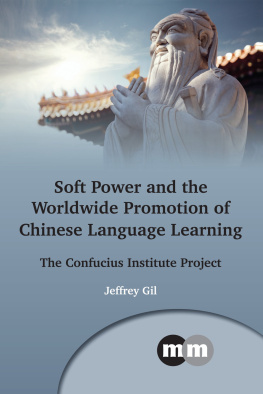A timely intervention, this volume reestablishes China at center stage where its screen cultures challenge the Western discourse on Chinas deficit or failure in soft power and prove that soft power works best in unexpected, unintended ways and that social scientists have much to learn from cultural studies and humanities scholars whose research demonstrates values of plurality, heterogeneity, and unpredictability. A must-read for people interested in China studies, film and television studies, as well as communication and media studies.
Yingjin Zhang, Distinguished Professor of Chinese Studies and Chair of the Department of Literature at University at California, San Diego
A compelling collection, the book is a must-read for scholars interested in an ongoing debate concerning the complex relationship between global Chinese media and the propagation of Chinese culture, state and grassroots, top-down or bottom-up.
Ying Zhu, author of Two Billion Eyes: The Story of China Central Television
Screening Chinas Soft Power
Promoting Chinas cultural soft power by disseminating modern Chinese values is one of the policies of President Xi Jinping. This is usually understood as a top-down initiative, implemented willingly or unwillingly by writers, filmmakers, artists and so on, and often manifesting itself in clumsy and awkward ways, for example in the concept of the Chinese dream, intended to rival and perhaps appeal more strongly than the American dream. Yet, modern Chinese values are in fact put forward in many ways by many different cultural actors. Through analyses of film festivals, CCTV, Confucius Institutes, auteurs, blockbusters, reality TV, and online digital cultures, this book exposes the limitations of Chinas officially promoted soft power in both conception and practice, and proposes a pluralistic approach to understanding Chinese soft power in local, regional, and transnational contexts. As such, the book demonstrates the limitations of existing theories of soft power, and argues that the US-derived concept of soft power can benefit from being examined from a China perspective.
Paola Voci is an Associate Professor in the Department of Languages and Cultures at the University of Otago.
Luo Hui is a Lecturer in Chinese Studies in the School of Languages and Cultures at the Victoria University of Wellington.
Media, Culture and Social Change in Asia
Series Editor
Stephanie Hemelryk Donald, University of New South Wales
Editorial Board:
Gregory N. Evon, University of New South Wales
Devleena Ghosh, University of Technology, Sydney
Peter Horsfield, RMIT University, Melbourne
Chris Hudson, RMIT University, Melbourne
Michael Keane, Curtin University
Tania Lewis, RMIT University, Melbourne
Vera Mackie, University of Wollongong
Kama Maclean, University of New South Wales
Laikwan Pang, Chinese University of Hong Kong
Gary Rawnsley, Aberystwyth University
Ming-yeh Rawnsley, School of Oriental and African Studies, University of London
Jo Tacchi, Lancaster University
Adrian Vickers, University of Sydney
Jing Wang, MIT
Ying Zhu, City University of New York
The aim of this series is to publish original, high-quality work by both new and established scholars in the West and the East, on all aspects of media, culture and social change in Asia.
For a full list of available titles please visit: www.routledge.com/Media-Culture-and-Social-Change-in-Asia-Series/book-series/SE0797
49 Eastern Westerns
Film and Genre Outside and Inside Hollywood
Stephen Teo
50 Singapore Cinema New Perspectives
Edited by Liew Kai Khiun and Stephen Teo
51 Taiwan Cinema
International Reception and Social Change
Edited by Kuei- fen Chiu, Ming- yeh T. Rawnsley and Gary D. Rawnsley
52 Chinese Television and National Identity Construction
The Cultural Politics of Music Entertainment Programmes
Lauren Gorfinkel
53 Screening Chinas Soft Power
Edited by Paola Voci and Luo Hui
Screening Chinas Soft Power
Edited by Paola Voci and Luo Hui
First published 2018
by Routledge
2 Park Square, Milton Park, Abingdon, Oxon OX14 4RN
and by Routledge
711 Third Avenue, New York, NY 10017
Routledge is an imprint of the Taylor & Francis Group, an informa business
2018 Paola Voci and Luo Hui
The right of Paola Voci and Luo Hui to be identified as the authors of the editorial matter, and of the authors for their individual chapters, has been asserted in accordance with sections 77 and 78 of the Copyright, Designs and Patents Act 1988.
All rights reserved. No part of this book may be reprinted or reproduced or utilized in any form or by any electronic, mechanical, or other means, now known or hereafter invented, including photocopying and recording, or in any information storage or retrieval system, without permission in writing from the publishers.
Trademark notice: Product or corporate names may be trademarks or registered trademarks, and are used only for identification and explanation without intent to infringe.
British Library Cataloguing in Publication Data
A catalogue record for this book is available from the British Library
Library of Congress Cataloging in Publication Data
A catalog record for this book has been requested
ISBN: 978-1-138-66989-5 (hbk)
ISBN: 978-1-315-61793-0 (ebk)
Typeset in Times New Roman
by Wearset Ltd, Boldon, Tyne and Wear
Contents
PAOLA VOCI AND LUO HUI
PART I
Whats SAPPRFT got to do with it: the limitations, or failure, of Chinese soft power
PAUL CLARK
DANI MADRID-MORALES
VICTOR FAN
VANESSA FRANGVILLE
VIOLA SARNELLI
PART II
From EastWest to SouthSouth: localizing soft power
LUKE ROBINSON
LUO HUI
KEITH B. WAGNER
PART III
Auteurs, animateurs, and matchmakers: pluralizing Chinese soft power
PAOLA VOCI
WANNING SUN
ELENA POLLACCHI
GINA MARCHETTI
YINGJIN ZHANG
Paul Clark is Chair Professor of Chinese and Research Director in the School of Cultures, Languages and Linguistics at the University of Auckland, New Zealand. His latest book, Youth Culture in China: From Red Guards to Netizens (Cambridge University Press, 2012), focuses on 1968, 1988, and 2008. His current project, Recreating Beijing, examines changing leisure spaces in that city since 1949 and has recently been supported by a Marsden Fund grant from the Royal Society of New Zealand. He is also the author of The Chinese Cultural Revolution: A History (Cambridge, 2008) and Reinventing China: A Generation and Its Films (Chinese University Press, 2005), a study of the Fifth Generation filmmakers. His Chinese Cinema: Culture and Politics since 1949 (Cambridge, 1987) helped pioneer the international, academic study of Chinese films. Clarks first book was on Maori history. He studied at the University of Auckland, Peking University, and Harvard University.


